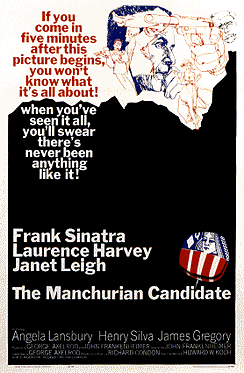 :
Study
Questions: Week Seven
:
Study
Questions: Week Seven  :
Study
Questions: Week Seven
:
Study
Questions: Week Seven
Korea II: POWs, Brainwashing, and the Code of Conduct
Prisoner of War (1954) and The Manchurian Candidate (1962).
1. Prisoner of War opens with a march of prisoners that is a winter version of the nortorious Bataan Death March of World War Two. Why does the film make so explicit comparison between the North Koreans and the Japanese in World War Two?
2. Describe the ways in which the manners, the dress, and the general appearance of Russian and North Korean officers identify them as the antithesis of American values even before they abuse the POWs? Consider the way they treat superiors and inferiors, their uniforms, etc.
3. The commanding officer of the prison camp claims his prisoners are "comrades" and his "equals." What indicates the circumstances are esactly the opposite? For those of you familiar with George Orwell's 1984, hoe does his speech parallel the totalitatian world in which Winston Smith lives?
4. What do you make of the attempts to "educate" the prisoners? What would you think if you were told that real POWs were subjected to similar "educational" techniques?
5. In what ways does the film tendency to excess tend to undermine its political message?
6. What sort of religious imagery is evident in the scene on "the hill" where the POW holdouts are tortured? How does this imagery reinforce the film's ideological position?
7. What is the significance of the emergency operation? Why did the filmmakers borrow this motif which is found in many World War Two films?
8. Prisoner of war shows all prisoners resisting enemy indoctrination. If this were actually the case, why would such a film be made at all?
9. One of The Manchurian Candidate's dominant motifs, the Queen of Diamonds, appears first in the opening credits. How does it identify the film's arch villain(ess) and link the film's psycho-sexual and political themes?
10. During the homecoming sequence, Raymond Shaw's (Laurence Harvey) mother (Angela Lansbury) refers to him and to her husband (James Gregory) as "my two little boys," for whom she wants only the best. Given her secret life and her her imperious character, what does her comment reveal about her view of men? Why is Jocelyn Jordan (Leslie Parrish) also linked to the Queen?
11.The film's hero (Frank Sinatra) is named Bennett Marco. How does his name reflect the social assimilation of ethnic characters? Consider how he got his first name as well as the ethnic echoes of his family name.
12. In what ways does the dream that haunts Major Marco and a former corporal, Al Melvin (James Edwards), constitute the ideological and thematic center of the film? To be more specific, why do the communist brainwashers become transformed into a group of well-to-do, motherly American women attending a suburban garden club meeting. Why do they reflect the race of the dreamer?
13. To what degree might one argue that the Freudian themes in The Manchurian Candidate are in conflict with the film's political themes? Consider these questions: Are Raymond's primary problems (those which make him a killer) rooted in his relationship with his mother or in the communist brainwashing? How does making her the chief Soviet agent confuse the issue?
14. When Shaw saves Jocelyn Jordan, there is a reference to her father's fear of snakes as "very Freudian." In what ways might the entire film be seen as "very Freudian"?
15. What political figure of the 1950s is satirized in the figure of Senator Iselin? What irony is evident in his going to a costume party as President Lincoln? Why does a character claim that if the Senator "were a paid Soviet agent, he could not do more harm [to his country] than he is right now"?
16. Why is Shaw so unloveable? Why does he sneer at the Army, at TV, at Christmas, and at family life? Why, in short, does he hate American culture?
17. Throughout the film, flags, eagles, and busts of national heroes are prominent in various settings, from the picture of General Douglas MacArthur in a Korean brothel to the bust of Lincoln in the room where Shaw's mother gives him his final assignment? What is their symbolic significance, and how to they seve as ironic comments on the action taking place?
20. How is the relationship between Marco and Rosie Cheyney (Janet Leigh) offered as a contrast to the other couples in the film? How do they serve to embody positive (that is American) values?
21. Describe a few of the reasons why The Manchurian Candidate might be regarded as the political/ideological antithesis of Prisoner of War?
22. Now for the really important question. If you were watching Prisoner of War in 1954, which character would you pick to be elected President of the United States in 1980?